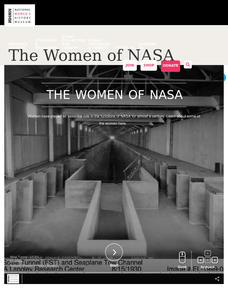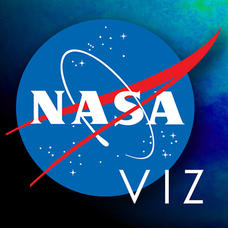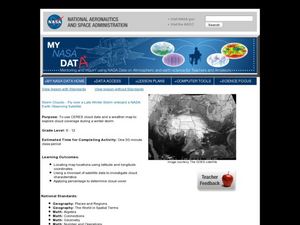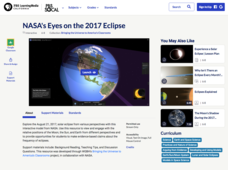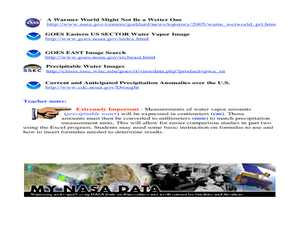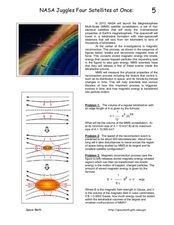NASA
NASA: Moving Cargo
How does NASA transport people and cargo to planets? The five-lesson unit breaks down the transportation system that scientists use to transport cargo to space. Pairs team up in order to devise a transportation system that will...
National Woman's History Museum
The Women of NASA
Human computers? Although it may sound like science fiction, the term was used to describe the women who made the NASA calculations before the advent of electronic computers. A 21-slide presentation introduces viewers to the women who...
Curated OER
Space: NASA's Frontier
Students research the history and accomplishments of the American space program and ponder its role in the future. They gather research on NASA and make small group presentations to the class on their findings and assessments.
Curated OER
NASA Plans Moon Base
Students react to statements about the moon, then read a news article about NASA's plans to build a permanent base on the moon. In this space science and current events lesson, the teacher introduces the article with a discussion and a...
Curated OER
Ask a NASA Engineer
Students develop questions to ask a NASA engineer to email them. After emailing the quesitons to the volunteer, the answers are sent to the class via the same method. To end the lesson, they formulate more questions and repeat the process.
Curated OER
Exploring Photosynthesis with NASA Remote Sensing Data
Young scholars explore photosynthesis using NASA satellite data. In this inquiry based biology lesson plan, students will look at data from a chosen national park to determine when the maximum amount of photosynthesis is occurring. This...
NASA
NASA Visualization Explorer
Read some of the most up-to-date information available from NASA's current Earth and space research! Along with showcased stories, you will find computer animations and satellite images that help you to view what humans cannot see with...
NASA
NASA
Everything you have ever wanted to know about our solar system, space exploration, and more can be found here. Be prepared to clear your schedule; you will be sucked into the app like a star into a black hole.
National Wildlife Federation
Get Your Techno On
Desert regions are hotter for multiple reasons; the lack of vegetation causes the sun's heat to go straight into the surface and the lack of moisture means none of the heat is being transferred into evaporation. This concept, and other...
Curated OER
Storm Clouds-- Fly over a Late Winter Storm onboard a NASA Earth Observing Satellite
Students study cloud data and weather maps to explore cloud activity. In this cloud data lesson students locate latitude and longitude coordinates and determine cloud cover percentages.
National Woman's History Museum
Breaking Through Gender Roles: The Women of NASA
Whether recognized or not, extraordinary women were integral to breaking gender barriers and putting Americans into space. For Women's History Month, explore a series of video clips and biographical information that profile these...
PBS
NASA's Eyes on the 2017 Eclipse
How did the 2017 eclipse look in Los Angeles—or Chicago? Experience both views, plus many more, using a lesson from PBS's Space series for middle schoolers. Scholars follow the movements of the sun, moon, and Earth during the most recent...
Curated OER
NASA Anniversary
In this NASA Anniversary worksheet, learners complete activities such as reading a passage, phrase matching, fill in the blanks, correct words, multiple choice, spelling, sequencing, scrambled sentences, writing questions, survey, and...
Curated OER
Engineering Lessons Adapted for Special Education
Modifying engineering lessons from NASA makes them accessible to a wider variety of learners.
Curated OER
A Comparison Study of Water Vapor Data to Precipitation over North America
Students use NASA satellite data to compare water vapor over the United States. For this data analysis lesson students use an Excel spreadsheet to map their data.
DocsTeach
The Process of Early Space Flight: The Gemini Program
Ideas take flight in an exciting activity on the NASA Gemini Program. Young scholars analyze photos from NASA's Gemini Program and place photos in the correct sequence of events. Academics also discuss the program and how the steps to...
NASA
Let's Investigate Mars
Take your science class on a hypothetical field trip to Mars with an engaging astronomy lesson. After first learning about NASA's Mars rover missions, young scientists plan their own scientific investigations of Earth's...
NASA
Dark Matter NASA Conference
Young scholars calculate the escape velocity of planets in our solar system and use that knowledge to calculate the escape velocity for NGC 2300 group. They then suggest reasons for the escape velocity to be higher than possible given...
Curated OER
NASA Juggles Four Satellites at Once
In this NASA satellites worksheet, students read about the Magnetosphere Multi-Scale satellite constellation that NASA will launch in 2013. They solve 4 problems including finding the volume of the MMS constellation, finding how long it...
NASA
Beginning Engineering, Science, and Technology
Space, the Final Frontier. The nine NASA-created challenges in this unit are designed to teach class members the engineering design process. Each challenge comes with teacher and student pages that can be used individually or as a...
Curated OER
Radiation Comparison Before and After 9-11
Using the NASA website, class members try to determine if changes could be detected in cloud cover, temperature, and/or radiation measurements due to the lack of contrails that resulted from the halt in air traffic after the attacks...
Curated OER
Seasons and Cloud Cover, Are They Related?
Students use NASA satellite data to correlate cloud cover over Africa to the solar declination.
Curated OER
The Right Ratio of Rest: Proportional Reasoning
Students see how NASA scientists are studying the circadian timing system to improve astronaut's physical and mental tasks while working in space. They demonstrate how fractions, decimals, and percents are related.
Curated OER
Cloudy vs. Clear
Students analyze line plots. In this weather activity using real NASA data, students discuss how weather affects the way the Earth is heated by comparing different line plots.
Other popular searches
- Nasal Passages
- About Nasa
- Nasa Planets
- Nasa Robots
- Nasa Lesson Math
- Nasa Aircraft
- Nasa Materials
- History of Nasa
- Nasa Lesson Plans
- Nasa Web Based Textbook
- Nasa Aurora
- Contributions of Nasa



